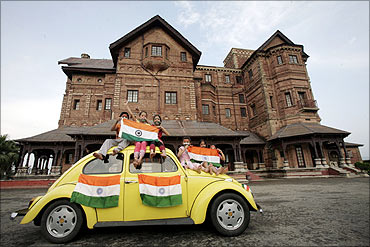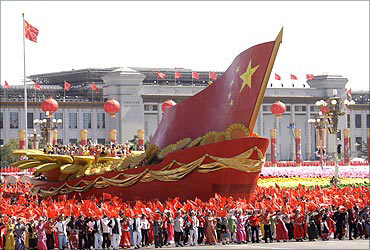 | « Back to article | Print this article |
China, India spur rise of the South
The rise of China and India is helping lift the economies of the South, said a report published by the OECD Development Centre, Paris, in June.
The report, Perspectives on Global Development 2010 -- Shifting Wealth, is the centerpiece of a Global Policy Dialogue co-hosted by the OECD Development Center and Global Development Network -- a platform for economic research institutes from developing countries.
Shifting Wealth tells the story of how 'South-South' cooperation is giving the world's poorest economies an opportunity for growth, focusing on the effects of the changing patterns of trade, aid and foreign direct investment.
According to Johannes Jutting, head of the poverty reduction and social development unit at the OECD Development Centre and co-author of the report, the number of developing countries catching up with rich countries has jumped from 12 to 65 in the last 10 years.
Click NEXT to read further. . .
China, India spur rise of the South
Simultaneously, the number of poor countries has fallen by more than 50 per cent, from 55 to 25.
India itself, considered a poor country in the 1990's, has moved up to become a "convergent" country, helping other poorer countries to rise.
The report claims that for the first time in history, developing countries like China, India and Brazil, have reached a "critical self-sustaining mass". Backed by the exponential growth of China and India, the success of South-South relationship has enabled many developing countries to rebound after the economic crisis.
Developing countries were responsible for 75 per cent of global growth from 2005 to 2009.
By 2030, non-OECD countries may constitute 57 per cent of global GDP on a PPP basis, compared to 38 per cent in 1990.
From 1990 to 2008, South-South trade's share of global trade jumped from 7.8 per cent to 19 per cent, a 20-fold increase, while trade worldwide quadrupled.
Click NEXT to read on. . .
China, India spur rise of the South
For poor countries to capitalise on these increasing trade flows, Jutting explained, "We calculated that if developing countries reduce their existing tariffs on Southern trade to match Northern countries, they stand to gain $59 billion."
This is double the amount they would gain if they reduced tariff equivalently for Northern trade.
The report shows a similar trend in South-South FDI exchanges and aid. For the first time, FDI flows from the developed world to the emerging countries have overtaken North-North flows.
In the developing world, China leads the pack with an estimated investment stock of $1 trillion. India, Brazil, South Africa, Chile and Malaysia have also become sources of FDI for less developed countries.
Click NEXT to read further. . .
China, India spur rise of the South
Since 1990, non-OECD countries have also increasingly contributed to aid flows to less developed ones, the amount increasing by a 100-fold in the past decade.
To buttress the intellectual foundations of this new development process, GDN is investing in think tanks and research institutions in the countries of the South.
Jutting said, "We are seeing a flourishing of academic institutions in the South, which increases the possibility of peer review learning." More than 40 per cent of the world's researchers are in Asia today.
"It will be an interesting paradigm shift when our world economic powers are the very same countries saddled (now) with a high proportion of poverty," said Gerardo della Paolera, president of GDN.
India is growing at a handsome pace of 8.8 per cent, while a third of its population lives below the poverty line.
Click NEXT to read further. . .
China, India spur rise of the South
GDN is "a platform for researchers from the developing world that seeks to create a 'critical mass' of intellectual talent that will help produce ideas which leaders can implement to improve the quality of life of their citizens," said della Paolera.
A founding president and rector of Universidad Torcuato di Tella in Buenos Aires and president of The American University of Paris, he is at present head of the New Delhi centre of GDN.
"We shifted our headquarters from Washington to Delhi in 2005 in recognition of the evolving global economic dynamics from the West to the East." he explained.
This shift is the focus of the first GDN Global Policy Dialogue being held in Delhi on September 23. Focusing on the rise of South-South ties, the Dialogue aims to develop policy responses for poor countries that are currently not benefitting.





